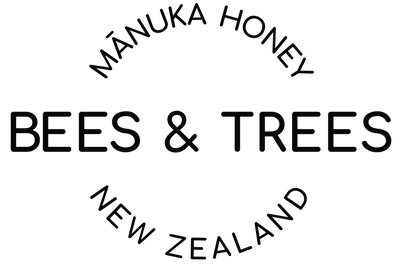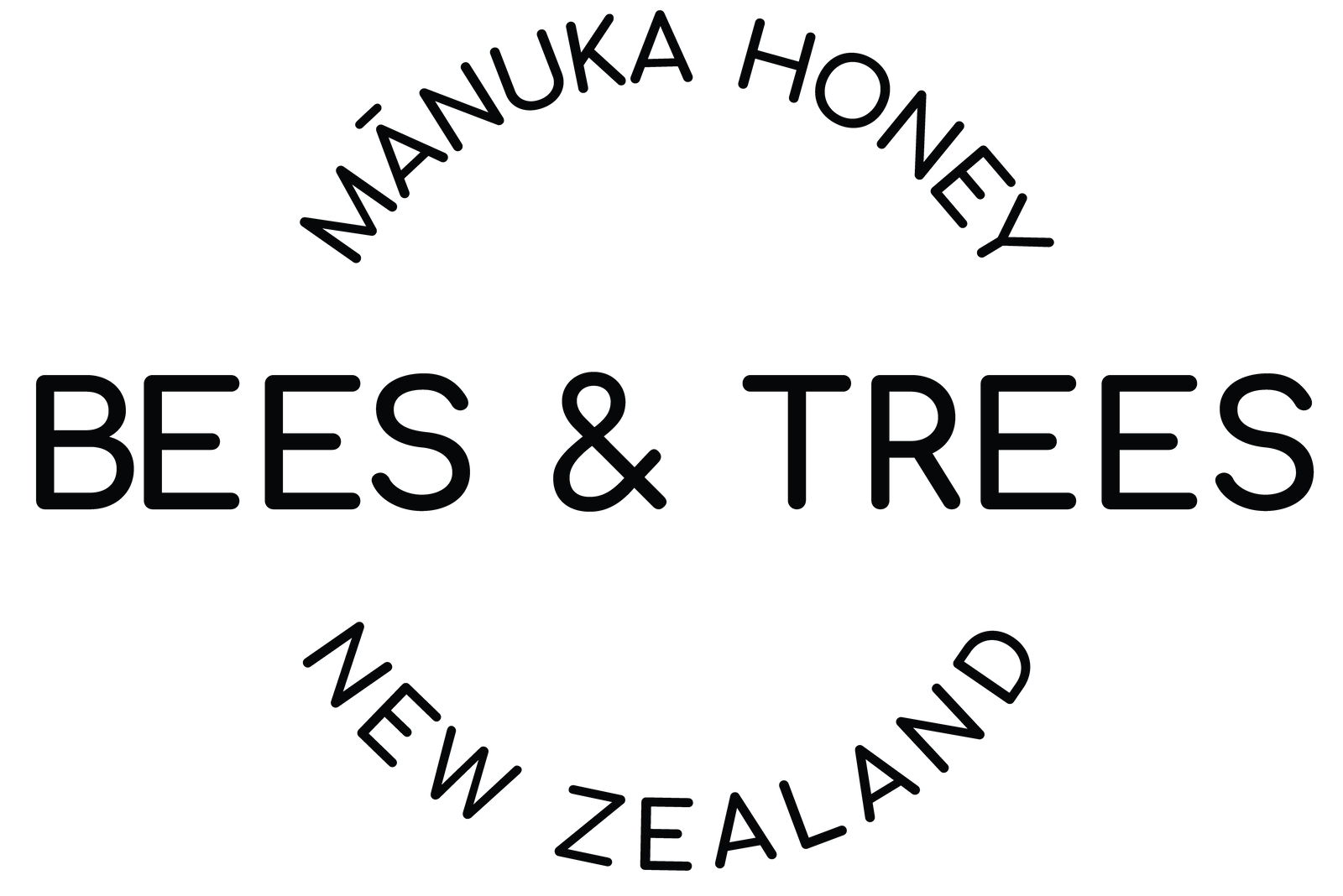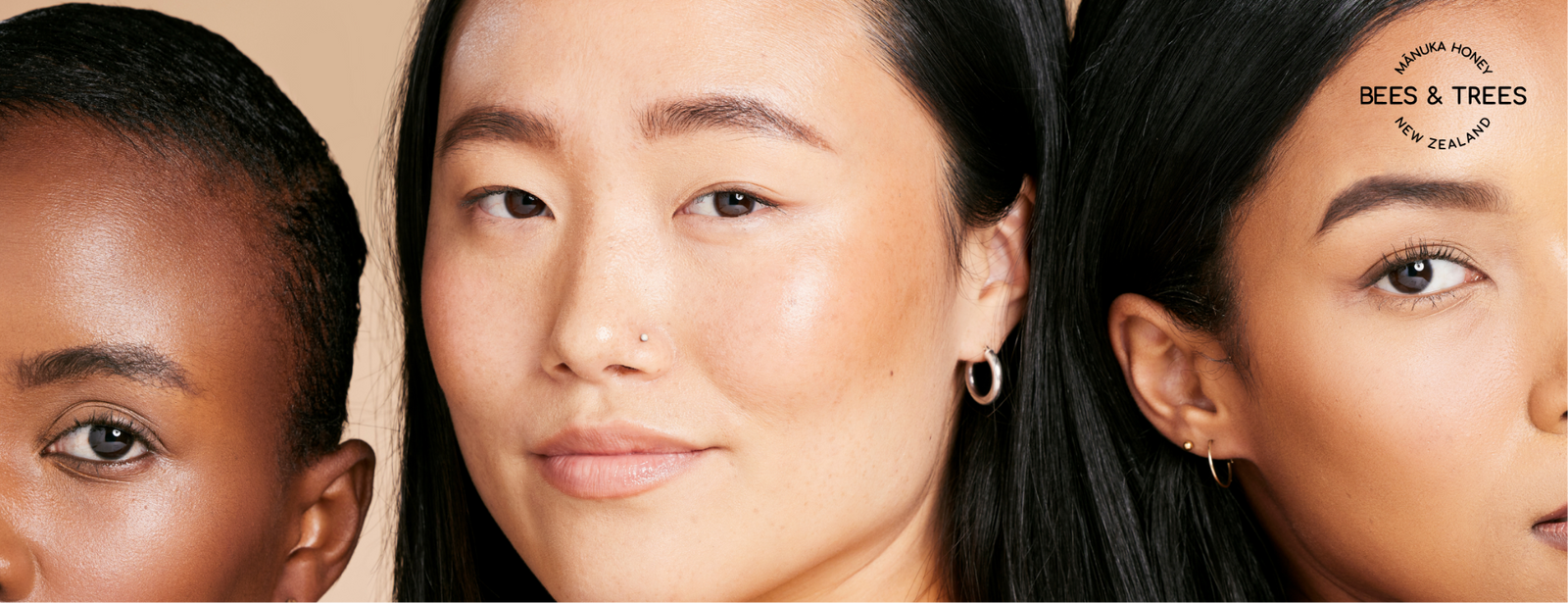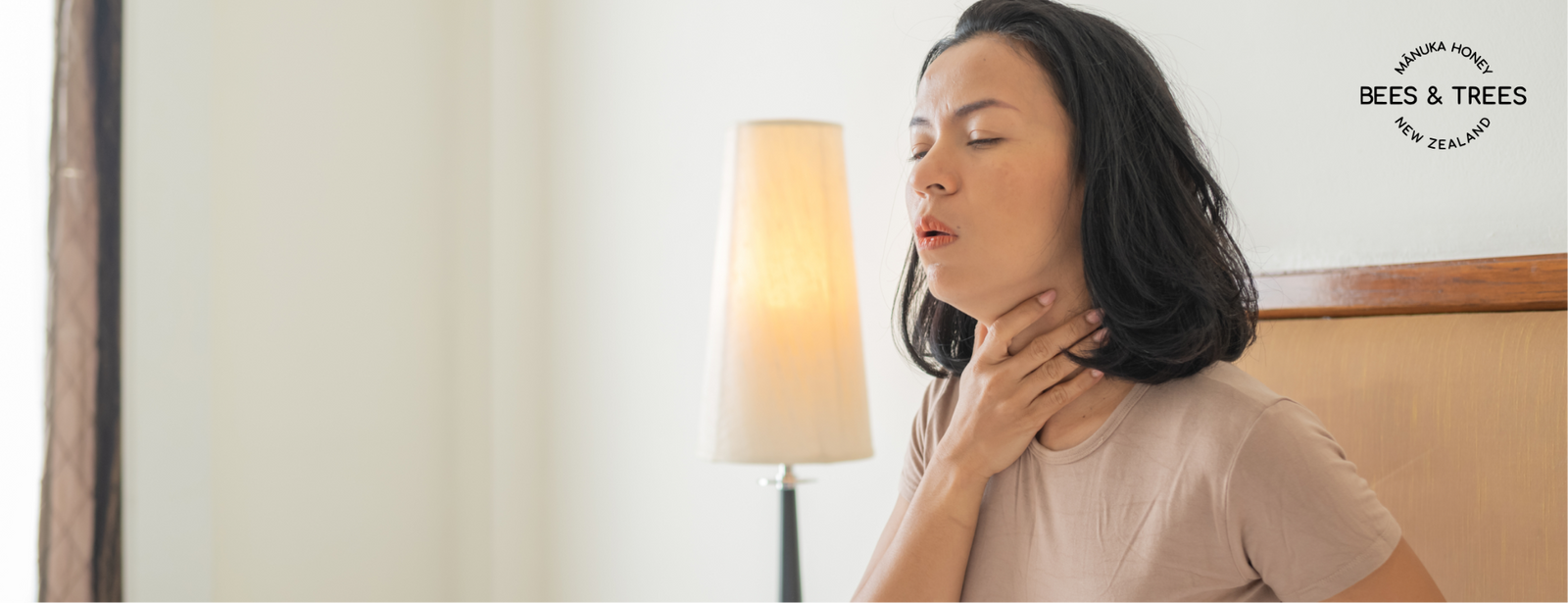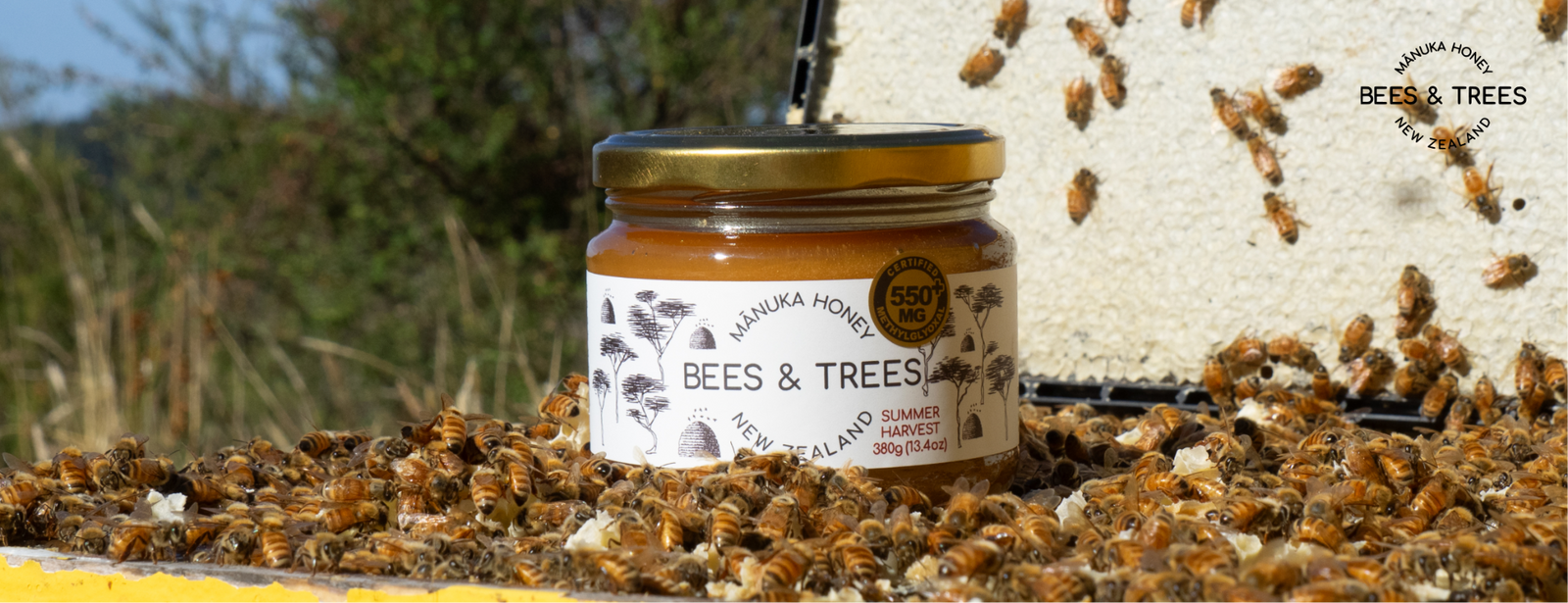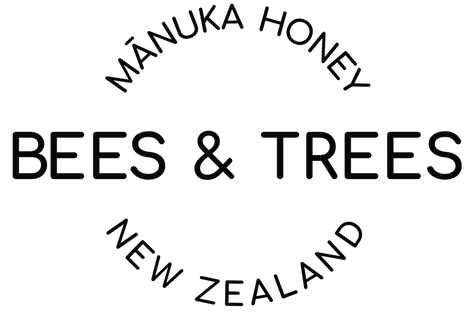The Role of Manuka Honey for Oral Health

Manuka honey is one of nature’s strongest healers and has served historically as a remedy to a variety of ailments. This all-natural superfood boasts numerous health benefits for the human body – inside and out.
One common question we receive here at Bees & Trees is, “Can Manuka honey’s health and wellness benefits extend to oral care?” This article is written to provide this answer and present an in-depth overview of how to use Manuka honey for oral health care routine, combating common troubles such as bad breath, dental plaque, dental infections, and dental diseases.
Manuka Honey for Teeth: Properties and Health Benefits of Manuka Honey

As written above, Manuka honey possesses an array of incredible health and wellness properties. These powerful, all-natural health benefits directly correlate with Manuka honey’s Methylglyoxal concentration. Methylglyoxal (MG or MGO) is a naturally occurring organic compound found in Manuka honey. Higher MG concentrations in Manuka honey provide more efficacy or potency in regards to the overall health and wellness properties of the honey. The amazing properties of Manuka honey include: antibacterial, antiviral, anti-inflammatory, antioxidant, antimicrobial and antiparasitic qualities.
Can Manuka Honey Eliminate Bad Breath?

Bad breath, also known as halitosis, is a common oral health concern where the main symptom is bad smelling breath and it can be caused by a variety of reasons such as types of foods, tobacco products, poor oral hygiene, dry mouth, medications, oral infections and nose or throat infections. Manuka honey’s strong antibacterial properties work to eradicate bad bacteria and may be a promising all-natural method in eliminating and preventing bad breath.
One study conducted by Tsurumi University’s Department of Oral Bacteriology, School of Dental Medicine, featured ten healthy subjects. Each subject’s halitosis was measured before and after the intake of Manuka honey or acacia honey. This study found that bad bacteria, causing bad breath, “decreased after intake of both honeys, but the decreasing effect of Manuka honey was markedly stronger than that of acacia honey.” [1] In addition, “the results indicated that the decreasing effect of halitosis by Manuka honey would originate from the strong antibacterial activity of MGO.” [1] The research above further reinforces the idea that Manuka honey and it’s potent antibacterial properties may be a great eliminator of bad breath and bad bacteria alike.
What Is Manuka Honey’s Effect on Oral Plaque?

Oral plaque is the sticky, colorless or pale yellow film that is constantly forming on your teeth. When saliva, food and fluids combine, oral plaque forms between your teeth and along the gum line. Oral plaque is composed of bacteria and begins forming on teeth 4-12 hours after brushing in the form of soft bacterial plaque. If soft bacterial plaque is not removed, it begins to harden, making it harder to remove and can potentially lead to an early stage of gum disease called gingivitis. If you are looking for a preventive and/or combatant to oral plaque, Manuka honey and its superior antibacterial properties may serve as both
One study, conducted by the Department of Periodontics, Modern Dental College & Research Centre, researched on Manuka honey’s effect on oral plaque. The study consisted of 6 male students, that were dentally cleaned to be 100% free of oral plaque or calculus (hardened oral plaque), and split into 3 control groups: the Manuka honey rinse group, the chlorhexidine gluconate mouthwash group and the xylitol chewing gum group. The study found that, “[Manuka] honey not only stops the growth of dental plaque bacteria but also reduces the amount of acid produced, which stops the bacteria from producing dextran. [2] Dextran is an organic compound, from sucrose (sugar), that enables bacteria to form plaque. Similarly, one pilot study found that Manuka honey, “could be used to reduce dental plaque. When using honey, consideration needs to be given to its quality and antibacterial activity.” [3] The results of the two studies examined above uphold that Manuka honey may have the ability to not only effectively remove oral plaque but prevent the building up of oral plaque due to its antibacterial qualities.
Can Manuka Honey Combat Oral Infections?
It is important to preface this question with a distinction between oral infections in contrast to oral diseases. Oral infections originate at the tooth or its supporting structures and can spread to the surrounding tissue. Oral diseases originate when the cells in your gums or oral tissue become damaged as a result of an oral infection. The most important distinction between both is that oral infections are reversible whereas oral diseases are typically irreversible, but treatable. Oral infections are classified in 3 types: Gingival (infection in the gums), Periapical (infection in the roots of a tooth), and Periodontal (infection in the bone and tissue that support a tooth). Poor oral hygiene, food that includes sugar or starch and untreated tooth cracks or cavities all can cause bad bacteria to multiply and infect a tooth and/or surrounding tissue – all leading to an oral infection.
Manuka honey’s antimicrobial properties work against a broad spectrum of microbes (bacteria, fungi and viruses) to sterilize and cleanse tissue from dangerous germs and may also help reduce inflammation and prevent bacterial infection with continual usage. Research indicates that honey may significantly reduce the severity of oral infections such as oral mucositis. Oral mucositis can occur when cancer radiotherapy treatments break down the rapidly dividing epithelial cells lining the gastro-intestinal tract (which begins from the mouth), leaving the mucosal tissue open to ulceration and infection.
One study, conducted by the Department of Oral Biology, de’ Montmorency College of Dentistry, tested subjects going through radiotherapy and half of the participants orally took 20 mL of honey daily, while the others took a saline solution. The results found that, “In the honey-treated group, the proportion of mucositis was lower and statistically significant as compared to the control group at the end of 6 weeks of radiation.” [4] The study concluded that, “oral intake of honey during radiotherapy is valuable in the reduction of severity of oral mucositis.” [4] The previous findings show evidence that the antimicrobial capabilities in honey like Manuka honey target infectious bacteria, decreasing the chances of infection spreading and could prove to be an all-natural alternative to infection prevention.
Manuka may have potential benefits in the treatment of periodontal disease. A 2017 study assessing the potential for subgingival application of manuka honey in treating periodontal diseases reported that Manuka honey was effective against plaque-associated bacteria. The study further said this finding was “In agreement with other studies [24, 28, 32], P. gingivalis, P. intermedia, and F. nucleatum, gram-negative bacteria associated with gingivitis and periodontal diseases, were more sensitive than the gram-positive species associated with gingival health (streptococci). Subgingival application of manuka honey could, therefore, conceivably promote health-associated species at the expense of those associated with periodontal diseases.” [5]
In a recent 2023 pilot study further investigating the effect of therapeutic Manuka honey as an adjunct to non-surgical periodontal therapy, researchers reported that “Despite the improvement in outcomes appearing modest in absolute terms, it was statistically significant for all follow-up time points, indicating the potential use of Manuka honey as a simple and affordable adjunct to non-surgical periodontal therapy.” [6] The positive results from this pilot study have encouraged the researchers to carry out a randomized clinical study on a larger sample, and we’ll make sure to add an update once the study is completed.
How Does Manuka Honey Inhibit Oral Diseases?

As stated in the above section, Can Manuka Honey Combat Oral Infections, oral diseases originate when the cells in your gums or oral tissue become damaged as a result of an oral infection. There are several types of oral diseases, this section will focus primarily on common oral diseases such as gingivitis and periodontal disease, which develop from untreated oral infections in the gums.
Gingivitis is a form of gum disease where the gums separate from the teeth, causing inflamed, swollen, puffy, receding or tender gums. Untreated gingivitis can lead to tooth loss and periodontal disease. Periodontal disease is a serious gum disease that occurs when gingivitis is left untreated. This disease damages gums, can destroy the jawbone and is usually caused by poor oral hygiene. Symptoms include swollen, red, and tender gums.
Manuka honey’s powerful antibacterial properties have been researched in search of a holistic inhibitor against oral diseases. One pilot study, conducted by the School of Dentistry, University of Otago, researched whether Manuka honey with high antibacterial activity could reduce dental plaque and clinical levels of gingivitis. The study featured 30 participants that chewed or sucked on Manuka honey chewable “honey leather” gum or sugarless chewing gum, 3 times a day for 10 minutes. “Analysis of the results indicated that there were statistically highly significant reductions in the mean plaque scores, and the percentage of bleeding sites, in the manuka honey group, with no significant changes in the control group.” [3] The study concluded that the, “results suggest that there may be a potential therapeutic role for manuka honey confectionery in the treatment of gingivitis and periodontal disease.” [3]
Ways to Use Manuka Honey for Oral Health Care

How to use manuka honey for teeth and gums:
Manuka Honey – A Spoonful A Day
Taking a few teaspoons of Manuka honey each day can do wonders for oral care by potentially eliminating bad breath, preventing oral plaque, combating oral infections and inhibiting oral diseases.
Manuka Honey Oral Health Paste
You can make your own homemade Manuka honey toothpaste by mixing castile soap, olive oil, Manuka honey and essential oils. This toothpaste is created from all-natural ingredients and can be more beneficial for your teeth than regular, commercial toothpastes.
Manuka Honey Mouthwash
Alternatively, you can mix some Manuka honey with warm water to form a natural mouthwash. Gargle and rinse after brushing for the best effects
Manuka Honey Gel
You can also use Manuka honey as a paste to apply directly to your gums and leave it on for a few minutes. This can help with gum inflammation and also to reduce plaque buildup on the teeth.
Summary

Oral health is crucial not just in keeping a clean smile but in maintaining overall health and wellness. Highly concentrated Methylglyoxal present in Manuka honey is what boasts such powerful antibacterial and antimicrobial properties that make for a strong combatant against bad breath, oral plaque, oral infections and oral diseases.
When purchasing Manuka honey – Choose Bees & Trees. We ensure transparency in each batch of our honey by providing you with independent lab reports on our website’s product pages. Our lab reports feature the level of MG or dietary methylglyoxal which correlates with the honey’s healing and wellness properties. Higher MG levels means better antibacterial properties of the honey. For those that are dealing with oral health concerns big or small, I hope this article provides a resource for further research and investigation.
Our goal at Bees & Trees is to share with our customers one of nature’s truly amazing foods, in its most raw and unadulterated form, derived from the meticulous work and natural behaviors of honeybees, including their rest patterns.
A note about the appendix.
For each of the studies that we reviewed in preparing this article, we’ve outlined some basic information about the study and included links to each study. We have noted if only the abstract, or if the full text of the study is available. Some of these links will be to the abstract, and may require clicking on the links under the title for the PMCID or DOI numbers to access the full text of the articles. Where we say that only the abstract is available, we mean for free. Anyone can purchase access to the full text of papers through various services which will be indicated on the abstract page. Don’t hesitate to contact us if you are trying to follow-up on a subject and having difficulty with a link or finding the article and we’ll try to assist. Please feel free to contact us at info@beesandtrees.com
Appendix
Research related to Manuka Honey and Dental Care
[1] Decrease of halitosis by intake of manuka honey
https://www.researchgate.net/publication/266771658_Decrease_of_halitosis_by_intake_of_manuka_honey
[2] Effect of Manuka honey, chlorhexidine gluconate and xylitol on the clinical levels of dental plaque
https://www.ncbi.nlm.nih.gov/pmc/articles/PMC3220139/
[3] The effects of manuka honey on plaque and gingivitis: a pilot study
https://pubmed.ncbi.nlm.nih.gov/15125017/
[4] The Effect of Honey on Radiation-induced Oral Mucositis in Head and Neck Cancer Patients
https://www.ncbi.nlm.nih.gov/pmc/articles/PMC5545960/
[5] Periodontal Application of Manuka Honey: Antimicrobial and Demineralising Effects In Vitro - PMC
https://www.ncbi.nlm.nih.gov/pmc/articles/PMC5368358/
[6] Therapeutic Manuka Honey as an Adjunct to Non-Surgical Periodontal Therapy: A 12-Month Follow-Up, Split-Mouth Pilot Study
